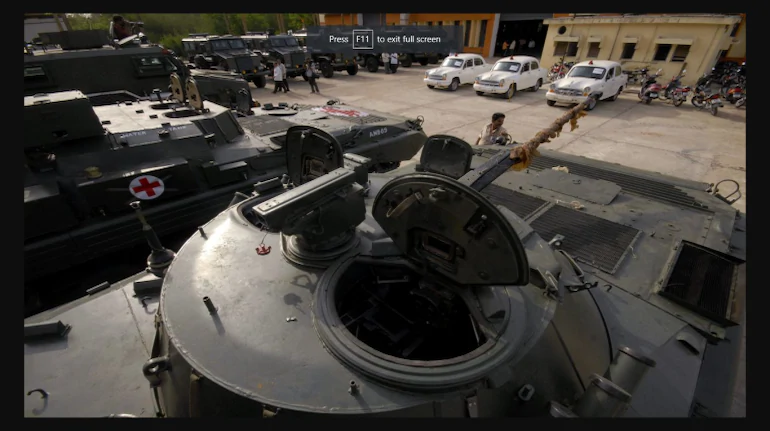
SOURCE: PTI
A group of senior Congress leaders on October 8 demanded that the government reverse its decisions on proposed privatisation of ordnance factories and FDI policy changes in defence sector, saying they compromise India’s national security interests.
The leaders, who were part of the 23 “letter-writers” seeking organisational overhaul of the Congress, include Leader of Opposition in Rajya Sabha Ghulam Nabi Azad, former union ministers Anand Sharma, Kapil Sibal, Manish Tewari, Shashi Tharoor, besides Vivek Tankha.
They have alleged that changes in defence offset policy will have long term implications for India’s defense preparedness and are in conflict with its ‘Make in India’ campaign and ‘Aatmanirbhar Bharat Mission’.
They said that the recent decisions of the BJP government regarding the defence sector, especially the proposed privatization of 41 ordnance factories, changes in FDI policy and diluting the Defence Offsets Policy including dispensing with the condition of transfer of technology in acquisition of weapons and equipment for the armed forces, are deeply disturbing.
“These decisions compromise national security interests and will have long term implications for India’s defense preparedness and in becoming a self-reliant nation. These decisions are also in conflict with the government’s ‘Make in India’ campaign and ‘Aatmanirbhar Bharat Mission’.
“We demand that the government review and reverse these decisions and policy changes in national interest,” they said in a joint statement.
The leaders said nearly 70,000 employees of all 41 ordnance factories across India are on a month-long strike to protest against the “corporatisation” of the Ordnance Factory Board (OFB).
The OFB unions claim that the government’s move to “corporatise” ordnance factories is in violation of agreements and assurances of the past.
The Congress leaders said the corporatisation/ privatisation of ROF (Royal Ordnance Factories ) in Britain met with a similar fate. They said the comparison is relevant considering the fact that the Indian Ordnance factories originate and are successors of ROF.
Citing the UK government’s decision in 1984 to make ROF’s an independent commercial organisation triggered intense debate in British Parliament and the government justified its decision saying it will help the new corporation set-up joint ventures, have private funding and will remove the burden of civil service bureaucratic processes.
“It is important to note that a similar logic has been put forward by the Ministry of Defence and the Finance Ministry as well regarding the corporatisation of OFBs in India,” they said in the statement.
The leaders expressed concerns saying the ordnance factories would be sold cheaply, would lead to job losses, monopolise private companies that would make huge profits from the Defence Ministry.
They said the OFB is accountable to the people of the country through Parliament and also to the CAG as ordnance factories are subjected to a periodical review by the Defence Ministry and the Parliamentary Standing Committee as well.
“The government must explain in what way the OFB has failed in transparency and accountability in a democratic system with checks and balances,” they asked.
Ordinance factories have huge infrastructure, production capacities and real estate at strategic locations across the country, the Congress leaders said, adding that these are valuable national assets which cannot be squandered away.
“What is needed today is an infusion of technology, manpower training and acquisition orders by the armed forces. Handing over the factories and assets to the private sector is bereft of any justification and against India’s national interest,” they said.
The group of leaders also expressed serious concern over the “unwarranted” changes in Defence Offset Policy and transfer of technology, saying these have been throughout an integral part of the defense acquisition policy.
“Accessing, acquiring and assimilating high end technologies for domestic production of weapon platforms and systems has been and must remain a national priority to reduce India’s dependence on defence imports,” they said in their statement.
Incidentally, this is the first time some among the “letter writers” in the Congress have issued a statement jointly with their signatures while criticising the government policy and independent of the party.
In a major move, India did away with offset requirements for government-to-government defence deals and single-vendor contracts under a new policy unveiled for the procurement of arms and military platforms for the armed forces, officials said.The Defence Acquisition Procedure (DAP) released by Defence Minister Rajnath Singh provides for allowing the three forces to take on lease military equipment, hardware and platforms like helicopters, simulators and transport planes as per operational requirements as it could be a cheaper option than their procurement, the officials said.






